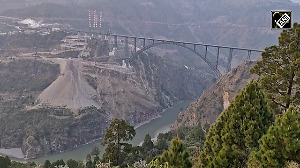Former Pakistan prime minister Imran Khan, who was arrested dramatically on Tuesday in a corruption case, is likely to remain in the custody of the country's anti-graft agency for 'four to five days' and is expected to be presented before an accountability court, a media report said on Wednesday.

Khan, 70, was arrested by the paramilitary Rangers in a corruption case from the Islamabad high court and bundled into a prison van sparking massive protests across the country by supporters of his Pakistan Tehreek-e-Insaf (PTI).
Khan's party has claimed that at least four people were killed and over a dozen injured in different parts of the country in violent clashes between the security forces and PTI supporters.
'At least four PTI workers were killed so far in different parts of the country on the firing of the law enforcement agencies. One each has been killed in Lahore, Faisalabad, Quetta, and Swat," senior PTI leader Shireen Mazari said on Tuesday.
Khan will be presented before the accountability court on Wednesday, a NAB source was quoted as saying by the Dawn newspaper.
We will do our best to keep him under custody for at least four to five days, the source said.
Under new amendments to the National Accountability Ordinance, 1999, the duration of physical remand has been cut from 90 days to 14 days, granted by any court.
We will seek the maximum physical remand of 14 days from the court, he said, adding that the court was expected to grant at least four to five days remand, the report said.
The arrest of the former cricketer-turned-politician comes a day after the powerful army accused Khan of levelling baseless allegations against a senior officer of the spy agency Inter-Services Intelligence.
When asked about the condition of the PTI chief, the source said Khan was detained in NAB's Rawalpindi/Islamabad regional headquarters in a comfortable atmosphere .
He will not be treated harshly, rather he will only be questioned regarding his alleged involvement in the case and seeking monetary benefits.
In an official statement, the bureau has also given the details about the case against Khan.
On Tuesday, a NAB official said that Khan has been arrested in the case related to Al-Qadir Trust, owned by the PTI chairman and his wife Bushra Bibi, which is about the setting up of Al-Qadir University for Sufism in the 2019 Sohawa area of Jhelum district of Punjab.
Khan's arrest warrant, issued on May 1, said that he was accused of corruption and corrupt practice.
The anti-graft watchdog has also justified the PTI chief's arrest with the help of Rangers from inside the court premises on Tuesday and termed it legal and purely according to the NAB laws.
NAB arrested former prime minister Imran Khan in the Al-Qadir Trust case. The case relates to illegal acquisition of land and construction for Al-Qadir University involving unlawful benefit given in recovery of prime proceeds (190 million pounds) through National Crime Agency, UK, the statement said.
The arrest has been made after fulfilling the lawful procedures of inquiry and investigation conducted by NAB, the anti-graft watchdog asserted.
It said during the process of inquiry/investigation, several notices were issued to Khan and his wife as they were the trustees of Al-Qadir Trust.
However, none of the call-up notices was responded to by the former prime minister or his wife.
Meanwhile, the NAB is also out to arrest other alleged characters in the Al-Qadir University and Trust case in which Khan was arrested and has completed the process to issue a red warrant through Interpol to arrest Khan's former adviser on accountability, Shehzad Akbar.
The name statement accused Akbar of being the key person in the case.
He (Akbar) and the former prime minister misled the federal cabinet by concealing the documents related to the settlement agreement. Money was received under the settlement agreement and was supposed to be deposited in the national exchequer, it added.
The NAB statement said the process of issuing of Red notice against former adviser Akbar, who is absconding, has already been initiated.
As the news of Khan's arrest spread, massive protests broke out in several cities across Pakistan. Protesters at several places turned violent and burned police vehicles and damaged public property.
For the first time, Khan's supporters smashed the main gate of the army's sprawling headquarters in Rawalpindi, where troops exercised restraint.
The protesters chanted slogans against the establishment.











 © 2025
© 2025